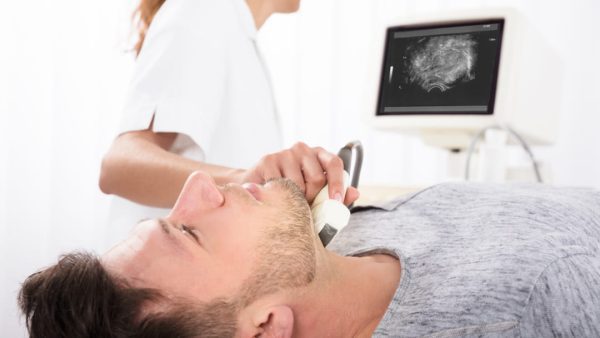Looking for Expert-Level VA Claim Answers?📱Call Us Now! 737-295-2226
If you’re a veteran diagnosed with hypothyroidism, you may wonder if you qualify for VA disability compensation. This guide discusses everything you need to know to file a winning VA disability for hypothyroidism claim.
Hypothyroidism is a severe and sometimes life-threatening condition that veterans may suffer from due to military service. Let’s dive into the VA disability claims process for hypothyroidism.
Table of Contents

How the VA Rates Hypothyroidism
To win a claim for VA disability for hypothyroidism, you need three essential elements:
- A current diagnosis of hypothyroidism
- An in-service event, injury, or illness that caused or aggravated your hypothyroidism (burn pit exposure, Agent Orange exposure, or another service-connected condition)
- A medical link (or nexus) between your hypothyroidism and the incident
Service Connection for Hypothyroidism
There are two common ways to establish service connection for hypothyroidism: presumptive service connection for Agent Orange exposure and secondary service connection.
With a direct service connection, you need to prove that your hypothyroidism is related to something that happened during your military service. This could be difficult if you didn’t know you had hypothyroidism while in the military. Burn pit exposure is one example. However, since this isn’t presumptive, the VA evaluates burn pit exposure for hypothyroidism on a case-by-case basis.
The VA has established presumptions for 17 conditions related to Agent Orange exposure, including hypothyroidism. If you served in Vietnam, Laos, Cambodia, Guam, American Samoa, Johnston Atoll, or the Korean DMZ during the prescribed periods and have been diagnosed with hypothyroidism; you don’t need to prove that your condition is related to your service. You just need to show that you were in an area covered under the VA’s Agent Orange presumptive exposure law.
Secondary Service Connection
If you don’t qualify for a presumptive service connection, you may still be able to get VA disability benefits for hypothyroidism through secondary service connection.
With secondary service connection, the VA recognizes that certain conditions can lead to other conditions. For instance, if medications for your service-connected PTSD cause hypothyroidism, the VA may grant you service connection for hypothyroidism.
Common service-connected disabilities that lead to hypothyroidism include:
- PTSD
- Diabetes
- Rheumatoid arthritis
- Cancer
- Hashimoto’s disease
To be granted secondary service connection for hypothyroidism, you must prove:
- You have a service-connected disability
- You have a diagnosis of hypothyroidism that isn’t already service-connected
- A doctor has medically linked the two conditions together with a nexus
Other conditions can also lead to hypothyroidism. It’s important to talk to your doctor and gather medical evidence to link your service-connected condition to your hypothyroidism.
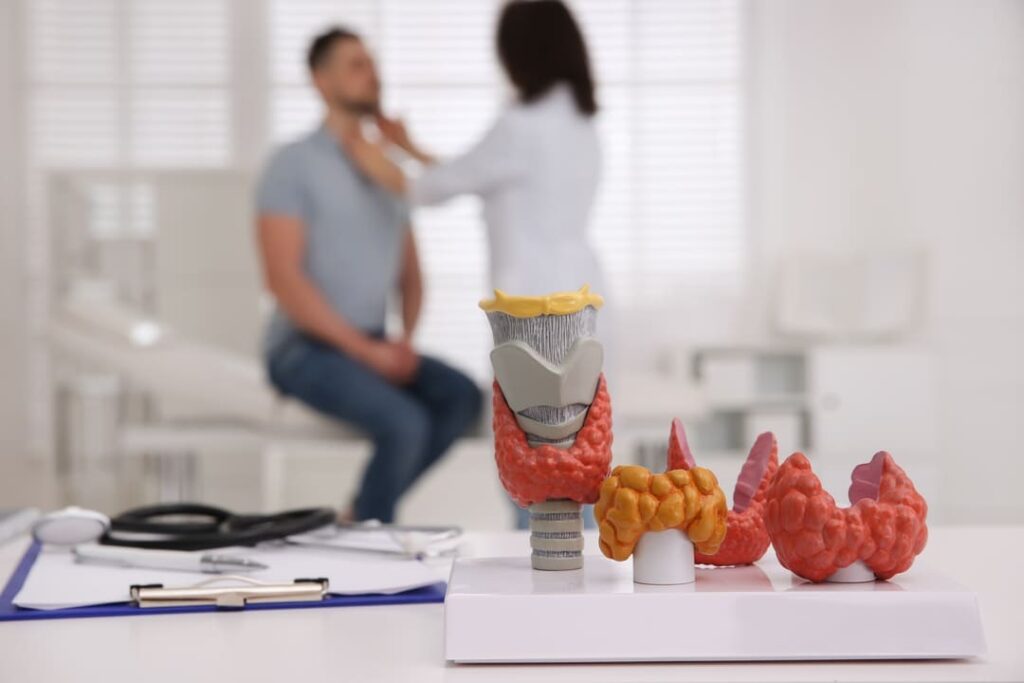
What is the VA Disability Rating for Hypothyroidism?
The VA rates veterans with hypothyroidism at either a 30% or 100% disability rating. The VA uses diagnostic codes to classify the type and severity of a disability. Diagnostic codes are specifically for disabilities that can be service-connected, which means caused or aggravated by military service. They’re also used to determine how much compensation a veteran will receive.
The VA rates hypothyroidism under Diagnostic Code 7903. Let’s look at the specific criteria that place veterans into the 30% or 100% rating categories.
100% VA Disability for Hypothyroidism
To be rated at 100% for hypothyroidism, you must be diagnosed with or show signs of a myxedema crisis and mental disturbance. Myxedema is a life-threatening condition where you suffer from cold intolerance, have a lot of muscle weakness, and your heart doesn’t work as well as it should, with issues including:
- Pericardial effusion – A condition in which fluid accumulates around the heart causing abnormal heart function, shortness of breath, chest pain, and fatigue
- Low blood pressure
- Bradycardia – A heart condition where the heart beats too slowly
30% VA Disability for Hypothyroidism
If you have hypothyroidism but don’t experience myxedema, you may qualify for a 30% VA rating.
Keep in mind there are other disabilities the VA rates involving the thyroid—including hyperthyroidism, thyroid enlargement, thyroiditis, hyperparathyroidism, and thyroid cancer. These are all different disabilities that are rated separately from hypothyroidism. You can learn more about rating criteria for those disabilities in the 38 CFR Schedule for Ratings.
VA Disability Rating for Thyroid Removal
The VA disability rating for thyroid removal is 60% if you can prove the surgery was required due to a service-connected condition.
Common causes for a full or partial thyroidectomy include:
- Thyroid cancer
- Noncancerous enlargement of the thyroid
- Overactive thyroid
- Suspicious or indeterminate thyroid nodules
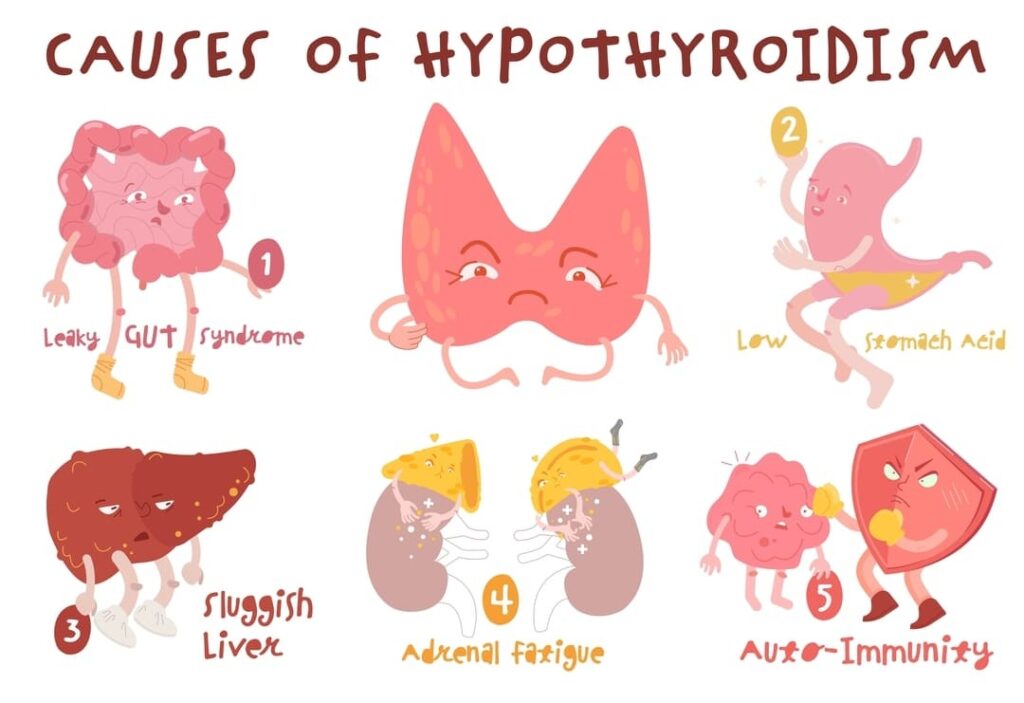
How Long Does a Hypothyroidism VA Rating Last?
Unlike other VA ratings, specific time limits are placed on a hypothyroidism VA rating.
The VA will only give you a temporary 100% VA rating for hypothyroidism, which is removed once your myxedema has been in remission for six months. The VA calls this “crisis stabilization.” Once your condition has been stable for six months, each symptom is rated separately under the appropriate body system (residuals). For instance, if your hypothyroidism is no longer manifesting as myxedema but still causing eye problems, you may be rated for visual impairment.
If you’ve been rated at 30%, the evaluation will only continue for six months after the initial diagnosis. After that, your symptoms will be rated under different body systems, just like if you were rated at 100% and stabilized for six months.
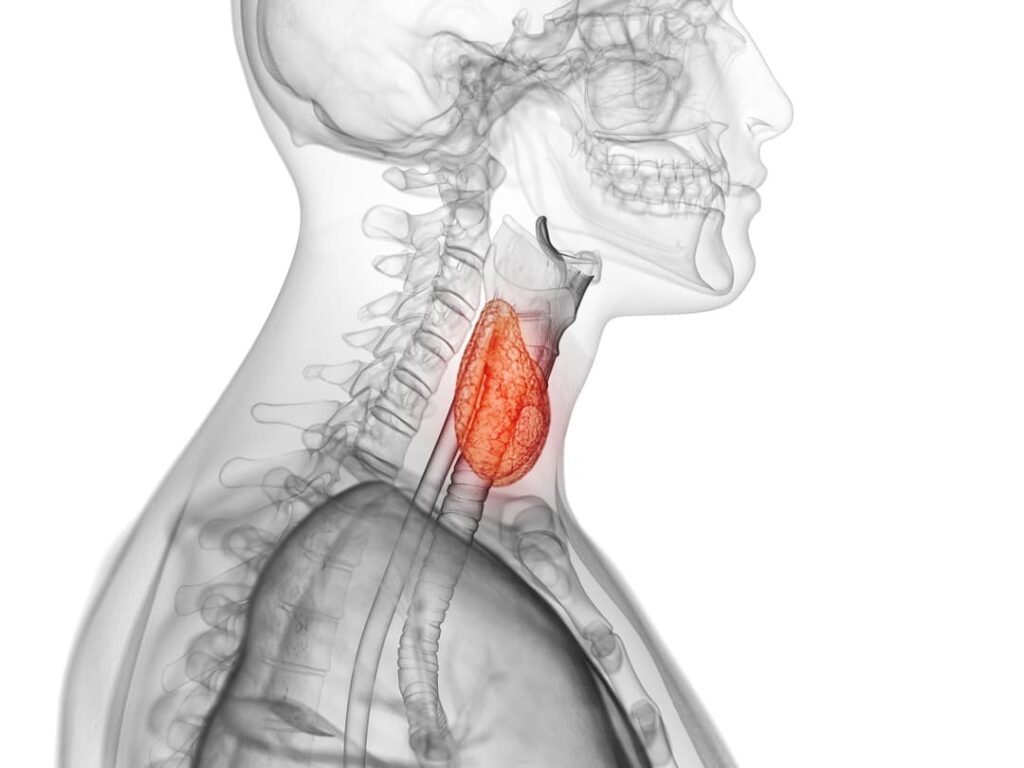
Deserve a Higher VA Rating?
Book a no-obligation VA Claim Discovery Call with an experienced team member. We’ll review your situation, spot what the VA may have missed, and help you map out a strategy to unlock the VA disability rating and tax-free compensation you’ve earned for your service. Click the red button below to book your call.
Filing a VA Disability Claim for Hypothyroidism
The first step in filing for VA disability for hypothyroidism is gathering your medical records and evidence. This includes treatment records, lab results, and doctor’s notes.
Hypothyroidism is usually diagnosed by the levels of thyroid hormones in your blood. A blood test can be enough to diagnose you with hypothyroidism.
A diagnosis of hypothyroidism is usually enough to rate a veteran at a 30% VA disability rating minimum. However, a lay statement documenting your symptoms and the impact on your life can help win your claim or increase your rating. Medical evidence showing baseline symptoms or worsening symptoms will also strengthen your claim.
Once you have everything gathered, you’ll need to fill out a VA Form 21-526EZ. This is the application for disability compensation and pension benefits.
You can file a claim:
- Online
- Via mail
- In-person at your regional VA office
You can read more tips in our post on filing a successful VA claim.
After filing, you’ll be scheduled for a Compensation and Pension exam. Your VA examiner will likely review your hormone levels through a blood test to confirm your hypothyroidism and discuss symptoms with you. It’s important to go into your C&P exam with the right mindset—be honest and vulnerable with your examiner and discuss how your hypothyroidism limits your work, life, and social functioning.
Once you’ve filed your claim and completed your C&P exam for VA disability for hypothyroidism, you must wait for the VA to process your claim and come to a decision. As of August 2022, the average time to process a claim is 125 days.
If you’re dealing with this condition, don’t give up hope. Treatment for hypothyroidism varies and can include: diet changes, vitamins, minerals, hormone supplementation, and holistic approaches (yoga, energy medicine, hydrotherapy, and traditional Chinese medicine).
The most important thing you can do now is to see your doctor if you haven’t been diagnosed yet. Hypothyroidism is a serious condition, but you can live a full life with the proper treatment. Don’t wait to file a VA claim to get the care and compensation you deserve.
If you’re a veteran suffering from hypothyroidism struggling to get the rating you deserve, the expert coaches at VA Claims Insider can help you file for a VA rating. We will help you gather the evidence and documentation you need to have the best chance of winning your claim. Contact us today to learn more about how we can help.
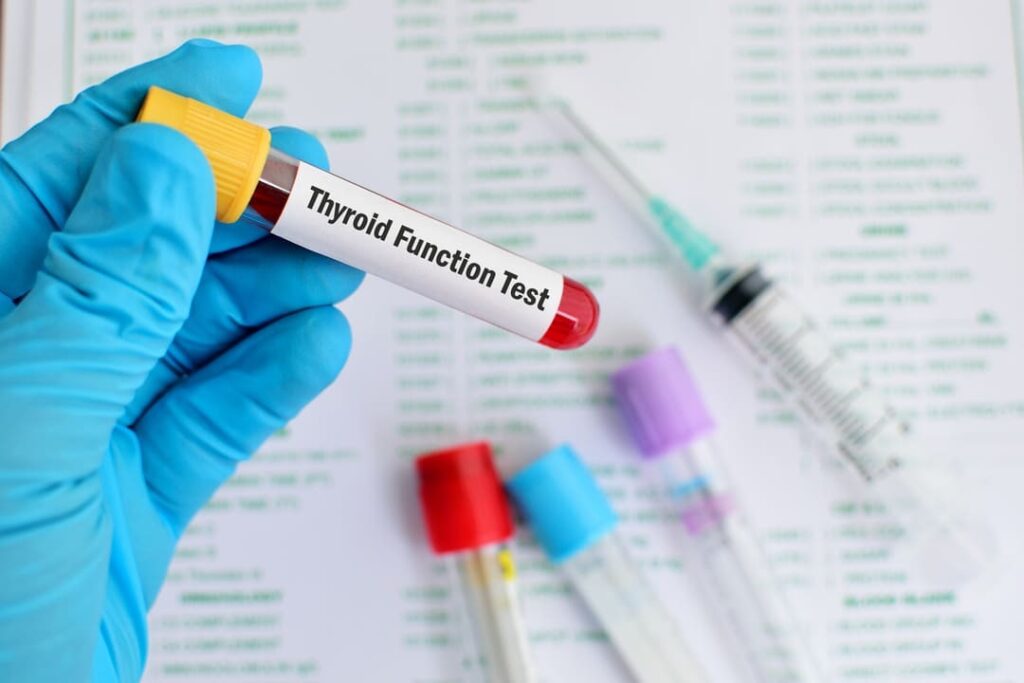
Hypothyroidism VA Disability (FAQs) Frequently Asked Questions
What is Hypothyroidism?
Hypothyroidism is an underactive thyroid. Symptoms slowly develop, and many veterans may not realize they have had a severe issue for years.
Hypothyroidism is a condition that occurs when the thyroid gland does not produce enough hormones.
What Causes Hypothyroidism?
Hypothyroidism occurs when the thyroid gland doesn’t produce enough specific hormones. This can happen for many different reasons, including:
- An autoimmune disease that causes your body to attack the thyroid gland
- Exposure to burn pits and other toxins
- Certain medications
- Previous thyroid treatment, including radiation therapy or treating an overactive thyroid
- Surgery to remove the thyroid gland
One of the leading causes of hypothyroidism is Hashimoto’s disease, an autoimmune disorder that causes your body to attack your thyroid gland. Hashimoto’s is a condition that can be granted service connection by the VA when warranted. Often, this is a result of burn pit exposure.
What are the symptoms of hypothyroidism?
Symptoms can vary from veteran to veteran but can include:
- Fatigue
- Cold sensitivity
- Hypothermia
- Heart abnormalities
- Weight gain
- Depression
- Slow movements or thoughts
- Memory problems
- Constipation
- Muscle pains
- Joint pain
- Carpal tunnel
- Dry skin
- Brittle hair and nails
- Hair loss
- Constipation
- Irregular menstrual cycles
- Infertility
- Low sex drive
If your thyroid levels are low, it can be life-threatening. This is called a myxedema crisis, which can cause heart failure and even lead to a coma.
Can I Get a VA Disability Rating for Thyroid Nodules?
Not exactly. To receive a VA disability rating for thyroid nodules, they must be accompanied by a thyroid condition for which the VA can award a disability rating. So, thyroid nodules without symptoms or other illnesses aren’t compensable under the VA Ratings Schedule for Disabilities.
What is the thyroid?
The thyroid is a small butterfly-shaped gland that sits at the base of your neck. It’s an important part of your endocrine system, which produces hormones that regulate many of your body’s processes, from energy levels to metabolism. If your thyroid isn’t working properly, it can impact your ability to live everyday life.
What are the two main thyroid problems?
Hypothyroidism occurs when your thyroid doesn’t produce enough hormones.
Hyperthyroidism occurs when your thyroid produces too many hormones.
Both conditions can cause various symptoms, including fatigue, weight gain or loss, mood swings, and difficulty concentrating.
NEED MORE ASSISTANCE?
Most veterans are underrated for their disabilities and therefore not getting the compensation they’re due. At VA Claims Insider, we help you understand and take control of the claims process, so you can get the rating and compensation you’re owed by law.
Our process takes the guesswork out of filing a VA disability claim and supports you every step of the way in building a fully-developed claim (FDC)—so you can increase your rating fast!
If you’ve filed your VA disability claim and have been denied or have received a low rating—or you’re unsure how to get started—reach out to us! Take advantage of a VA Claim Discovery Call. Learn what you’ve been missing—so you can FINALLY get the disability rating and compensation you deserve!
About the Author

Trisha Penrod
Trisha Penrod is a former active-duty Air Force officer. As an Intelligence Officer, she led teams of analysts to apply advanced analytic skills to identify, assess, and report potential threats to U.S. forces.
Trisha attended the U.S. Air Force Academy and holds an MBA from Webster University. After receiving an honorable discharge in 2018, Trisha worked as a growth marketer and utilizes her analytic skills to help others accomplish their business goals.

